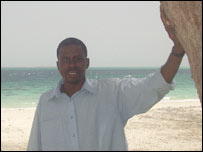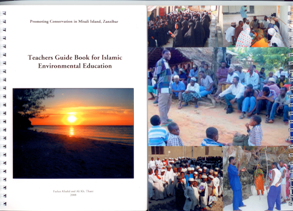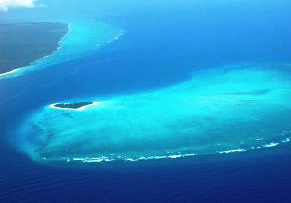For the first time, a practical Muslim Theology of the Sea
May 20 2008:
 |
 |
 |
Co-author Ali Kh.Thani has waived copyright in the hope that this theology of the sea, and the example of the teachers' guide will be used to help marine environments in Islamic areas elsewhere |
The first Muslim Theology of the Sea has now been published, by a far-reaching UK-based Muslim group called the Islamic Foundation for Ecology and Environmental Sciences (IFEES).
It was initially created as part of a Teachers’ Guide Book for Islamic Environmental Education, to promote conservation among the Muslim fishing families on Misali Island, Tanzania - who had been threatening the fragile coral environment through their dynamite fishing.
Although it was created for a specific reason, most of the theology and teachings are appropriate and useful for any marine conservation programme in Islamic areas, particularly in the tropics and sub-tropics - and the wording and geographical references can be adapted accordingly. The authors have waived their copyrights, and this material is available for all who wish to use it in the spirit for which it has been written.
In the following sections, the teachings of the Qur’an relating to marine management are divided into six themes. They begin with Tawhid (with Allah as the law-giver), continue through Fasad (acknowledging the human capacity for mischief and destruction) and concluding with the role of human beings as Khalifa (or stewards) of creation.
1. Tawhid, or Unity
 |
 |
 |
The guide book was published by IFEESin Swahili and in English |
Allah Ta’ala created everything (40:62): and that includes the sea and everything in it. He gave it form (59:24): that is, He shaped the coral and the fish and other creatures that live in it and determined their physical form, chemical composition and genetic structure. He regenerates and provides from heaven and earth (27:64) and this further explains the term "As Samad" in the key ayah (meaning sign). Earth (ard) is a term that includes both the terrestrial and marine environment. Thus the aspect of regeneration is also linked to everything the sea contains like coral reefs and fish stocks. Regeneration ensures the continuity of our livelihood and sustenance.
2. Khalq – Allah’s Creation or Natural Environment When Allah Ta’ala says He created “every animal from water" (24:45), this is intended to mean that we as humans are included in this process - and that the water is the sea. It is estimated that about two thirds of the human body consists of water. It should be noted that this statement was made in Al Qur’an many centuries before modern science discovered this fact. It is also a fact that all life, animal and vegetable depend on the sea for it is the source of all moisture that sustains us. The sea is thus beneficial to us in the wider context of our lives not forgetting that it keeps us alive with provision from its depths every day.
Al Qur’an says –
Anything you catch in the sea is halal for you – 5:96
He knows everything in the land and sea – 6:59
Without Misali Island there would have been no coral reefs - and it is a geological fact that they grow only in marine habitats similar to that found around the island. They are not found in the deep ocean.
 |
 |
 |
The coral environment around Misali island has been unbalanced by dynamite and, perhaps, rebalanced by the Qu'ran |
Coral reefs could be likened to a terrestrial forest with their own complete ecosystem where trees give shelter to bird-life and a host of other species forming a food chain. We are the ultimate beneficiaries of this chain as we are the ultimate beneficiaries of the food chain that the coral reef habitat supports. Like trees the corals are alive; they grow and after a period they die and they also react adversely to bad treatment.
3. Mizan – Balance It is easy to see the balance of creation when we look at a coral reef.
The storms, the surging seas, swelling tides are all part of this balance. Misali Island, which itself is formed entirely out of coral, is part of this balance for without it there would have been no coral reefs and therefore no fish.
All natural ecosystems of the earth are in ecological balance. The food web straddles terrestrial and marine ecosystems and they can be disrupted or changed by changes in environmental conditions. These changes can be natural or caused by humans as is the case with Misali. This balance, mizan, is the support mechanism that allows ecosystems to support plants, animals and humans.
The coral reefs, seaweeds, sea grasses and mangrove areas protect juvenile fish and the marine environment. If we destroy these environments and take these fish when they are small from these areas the balance of the ecosystems will have been disrupted.
4. Insan - HumankindOur connection with the sea is obvious. It is home to the fish we eat and Allah Ta’ala says “He created everything on the earth for us” (2:29).
The sea enables us to travel as Allah Ta’ala has made the sea “subservient to us” (45:12). We use it to go to Unguja or the mainland on special occasions and to go to Misali to catch our dinner. It also gives us the weather, which gives us rain, which allows us to grow food on land. All this is on the surface.
The sea hides many secrets in its depths. It is where the coral lives and it has taken thousands of years to form itself into a habitat where the fish can also live and spawn its young of which we are the ultimate beneficiaries.
5. Fasad – Mischief The condition of Misali is serious. This has been the result of the indiscriminate use of dynamite, dropping anchor over the coral, the collection of coral to make lime, the use of poison and other destructive gear.
Destroying the coral is like throwing dynamite at a mango tree for its fruit or perhaps even cutting it down: no tree no mango; no coral no fish.
These and other malpractices destabilise the ecosystem and consequently cause the depletion of fish stocks and other endangered marine species. It is conceivable that if we do not change our attitude to Misali and its surrounding marine habitat we will be seeing the total disappearance of the species of fish we depend on resulting also in the disappearance of our livelihood.
6. Khalifa – Stewardship What makes us different from all other living beings is that we are held accountable for our actions. This accountability requires us to take urgent action and introduce good conservation practices in Misali. As guardians of Allah Ta’ala’s creation we have a responsibility to the marine environment to protect it for what it is, a place of beauty and tranquillity and for what it means to us for our survival.
• Our primary concern should be to wisely manage the resources the marine environment offers and conserve the ecosystem for future generations.
• Fishing gear compatible with conservation practise should be used at all times.
• The no fishing zone in which fish are being allowed to breed for the future should be respected.
• The species that are in danger of dying out should be allowed to breed without being disturbed. Turtles, dolphins, whales, large shells (including the Giant Triton and the Bull-mouth Helmet shell) should be left alone.
• Overall care should be exercised when working in the fragile environment of the conservation zone.
Notes
The full guide was written and designed by Fazlun Khalid and Ali Kh.Thani – and was published by (IFEES) – the Islamic Foundation for Ecology and Environmental Sciences in the UK. The publication and distribution of the book was made possible by the generous support of Muslim Hands, Nottingham, and Islamic Relief Birmingham, UK.
The authors have foregone their copyright so that through this resource Muslims – wherever they live – may take a step towards preserving this green planet for future generations. They have, nevertheless, given permission for ARC to republish this Muslim Guide to Marine Stewardship on our website.
ARC was part of the management team who first worked with Misali islanders to stop dynamite fishing and take leadership on the management of their own marine environment, based on Islamic principles on how to live.
LINKSLink here for more about the full guidebook in which this was published.
Link here to learn more about the Misali Island project
Link here for more from Fazlun Khalid on how we started, as a human race, to waste so much.
Link here for a brief introduction to Swahili fishing traps, beginning to be used again in Islamic fishing communities in Kenya, combining tradition with environmental management.
|

